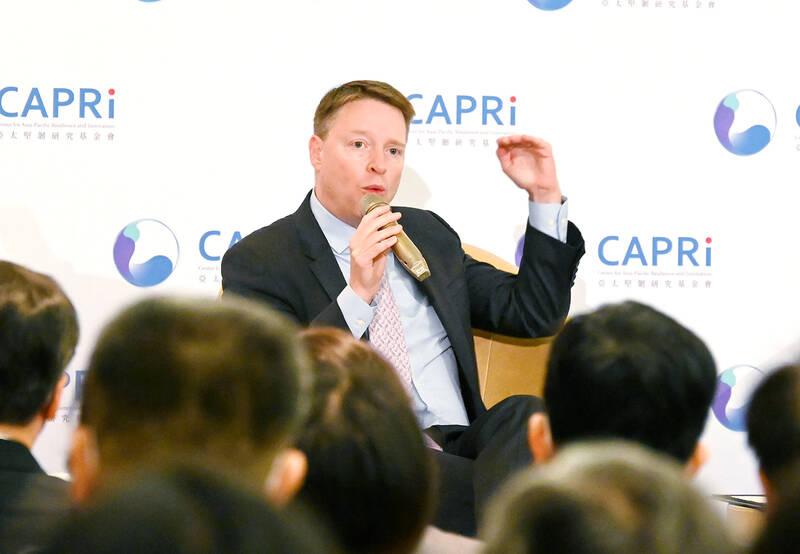Former US deputy national security adviser Matt Pottinger yesterday said Taiwan’s “silicon shield” would not deter China from invading the country.
Pottinger made the remark during a teleconference in Taipei when asked about a possible timeline for Beijing to be capable of launching a full-scale invasion of Taiwan.
The former White House official said that people could speculate about a timeline for a cross-strait war, but what was important for all parties involved was to take every possible step to deter that invasion “from ever taking place.”

Photo: Wang Yi-sung, Taipei Times
He went on to dismiss the popular notion that a “silicon shield,” meaning Taiwan’s strength in producing advanced semiconductors, would help it deter a Chinese invasion.
“I don’t think that there is such a thing as a silicon shield,” he said.
The leadership in Beijing, whose members have been trained under “Leninist dictatorships,” does not share the same logic as people in democratic societies, he said.
“And therefore, I think we should not — we should not kid ourselves that there is a silicon shield,” he added.
On the contrary, talks in China have suggested that Taiwan’s chip industry gives Beijing a reason to invade.
“I’ve seen some Chinese nationalistic lectures and public figures who give public talks saying that Taiwan’s dominance in semiconductors is a reason why Beijing should invade Taiwan,” he said, adding that what the US and Taiwan should do instead is deter an invasion at all costs.
Commenting on recent debate over Taiwan’s purchase of anti-tank mines and mine-dispersal systems from the US, Pottinger said the sales are intended to meet Taiwan’s defensive needs amid rising Chinese aggression.
“I would ask that people who were raising concerns about that system, [to] also vocalize concerns about the significant increase in missiles and rockets that the PLA [Chinese People’s Liberation Army] is deploying against Taiwan right now,” he added.
A number of opposition politicians and environmentalists have questioned the army’s decision to buy anti-tank munitions through a proposed purchase of Volcano minelaying systems from the US, saying it would litter Taiwan with landmines.
They also said the proposed deal, which was approved by Washington last month, of contravening the UN Ottawa Treaty.
The army has said that it had purchased only metal-cased anti-vehicle mines that would not be accidentally triggered by people stepping on them, adding that such munitions would only be deployed in the event of war.
The army also said that the sale did not breach local laws and international treaties such as the Ottawa Treaty, which only regulates the use of anti-personnel landmines.
Pottinger is a former journalist for Reuters and China-based correspondent for the Wall Street Journal. He served in the US Marine Corps, and from Sept. 22, 2019, to Jan. 7, 2021, he was US deputy national security adviser under then-US president Donald Trump.

Taiwan has received more than US$70 million in royalties as of the end of last year from developing the F-16V jet as countries worldwide purchase or upgrade to this popular model, government and military officials said on Saturday. Taiwan funded the development of the F-16V jet and ended up the sole investor as other countries withdrew from the program. Now the F-16V is increasingly popular and countries must pay Taiwan a percentage in royalties when they purchase new F-16V aircraft or upgrade older F-16 models. The next five years are expected to be the peak for these royalties, with Taiwan potentially earning

POSITIVE DEVELOPMENT: Japan and the US are expected to hold in-depth discussions on Taiwan-related issues during the meeting next month, Japanese sources said The holding of a Japan-US leaders’ meeting ahead of US President Donald Trump’s visit to China is positive news for Taiwan, former Japan-Taiwan Exchange Association representative Hiroyasu Izumi said yesterday. After the Liberal Democratic Party’s landslide victory in Japan’s House of Representatives election, Japanese Prime Minister Sanae Takaichi is scheduled to visit the US next month, where she is to meet with Trump ahead of the US president’s planned visit to China from March 31 to April 2 for a meeting with Chinese President Xi Jinping (習近平). Japan and the US are expected to hold in-depth discussions on Taiwan-related issues during the

‘LIKE-MINDED PARTNER’: Tako van Popta said it would be inappropriate to delay signing the deal with Taiwan because of China, adding he would promote the issue Canadian senators have stressed Taiwan’s importance for international trade and expressed enthusiasm for ensuring the Taiwan-Canada trade cooperation framework agreement is implemented this year. Representative to Canada Harry Tseng (曾厚仁) in an interview with the Central News Agency (CNA) said he was increasingly uneasy about Ottawa’s delays in signing the agreement, especially as Ottawa has warmed toward Beijing. There are “no negotiations left. Not only [is it] initialed, we have three versions of the text ready: English, French and Mandarin,” Tseng said. “That tells you how close we are to the final signature.” Tseng said that he hoped Canadian Prime Minister Mark Carney

STAY IN YOUR LANE: As the US and Israel attack Iran, the ministry has warned China not to overstep by including Taiwanese citizens in its evacuation orders The Ministry of Foreign Affairs (MOFA) yesterday rebuked a statement by China’s embassy in Israel that it would evacuate Taiwanese holders of Chinese travel documents from Israel amid the latter’s escalating conflict with Iran. Tensions have risen across the Middle East in the wake of US and Israeli airstrikes on Iran beginning Saturday. China subsequently issued an evacuation notice for its citizens. In a news release, the Chinese embassy in Israel said holders of “Taiwan compatriot permits (台胞證)” issued to Taiwanese nationals by Chinese authorities for travel to China — could register for evacuation to Egypt. In Taipei, the ministry yesterday said Taiwan